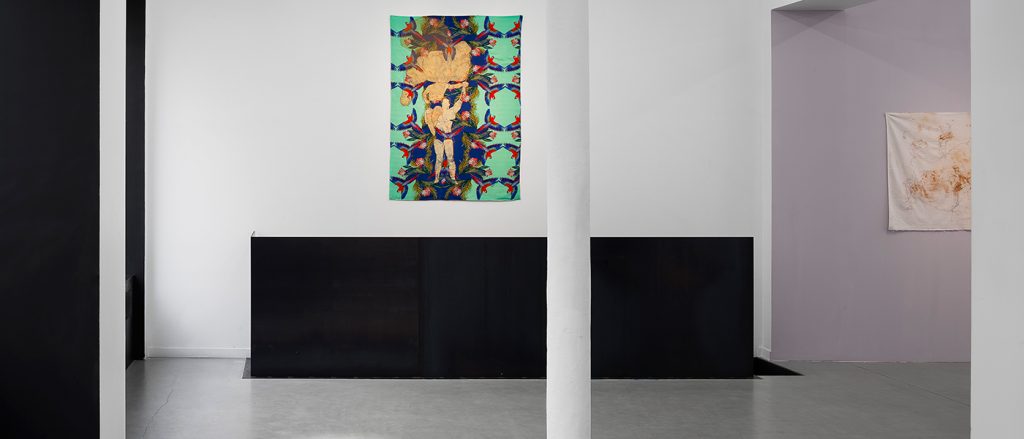
We will transmit desire, ecstasy, rage, cooperation and autonomy to make each other blossom fully and so reclaim our lives.’ Umut Yıldırım
Gözde İlkin’s artistic practice is based on a critical foundation that questions cultural codes, political and social relations, gender roles and power domains. With a view to crafting her comprehension of the world from a personal perspective and building up both memory and personal archives, she works with used home textiles like tablecloths, bed sheets and curtains, inserting images into the existing patterns with such techniques as embroidery and stitchery. In her works, İlkin brings into view human conditions that are often uncanny and open to different readings, where the dynamics of personal and social, private and public realms interpenetrate.
With this exhibition, the artist brings together a selection of the works that she has made since 2013, and others produced during her residency in the Turkey Workshop of Cité des Arts, Paris, in 2018. In the title-work, Organized Habitation, she illustrates the relationships between nature, animals and humans by placing human figures on tapestries whose patterns depict animals in their natural environments. Most often seen decorating the homes of rural migrants, these artificial sceneries point to a longing for nature aroused by the nature- deprived urban lifestyle, as well as unfolding the relationship between culture and nature.
This series of works is created in reference to ecofeminism, which sees critical connections between historical and contemporary forms of man’s domination of nature and the exploitation of women. It focuses on relational forms between humans and non-humans and proposes a more egalitarian model, while also including ‘thought clouds’ that are playful at times, questioning at others. Having based her previous works on family photos and on coexistences inherent in the concept of family across domestic and public domains, İlkin turns her gaze here to chosen kinships, to bonds forged between different species, and to alternative relationships that we could establish with nature.
The artist places together the destruction of nature and urban transformation – two sides of the same problem. In her video Stained Estate scenes from the demolition of Taksim Emergency Hospital located close to where she lives and shot exactly as she sees it from her window, is accompanied by an articulation of her feelings around the void left by the hospital and having to bear witness to it. This work, tracing our era of urban transformation that is brutally destroying all spatial memory, presents a stunning observation of what it is like to be constantly exposed to the sight and sound of ruination, and having to make them a part of her personal space. The invasive noise of construction, destruction and ruination that infiltrates her home and study all day long creates a contrast with the other works in the exhibition that deal with noise, yet are silent. Sounds in nature leak into such works as Waterfall, Rustle and Overheard.
The figures in Hush Money, The Scar, The Symptom, The Attendant II and The Attendant V that are on display in the exhibition are created with the contours that İlkin draws by stitching around patches of rust applied to textiles. These interventions, which bring to mind stains on fabrics, render the process of destruction and transformation visible.
A work on gender roles and their relationship to nature, Rampart portrays a spectacle of power involving two men on a colourful ornamented backdrop of nature and birds. The exhibition also includes the works, namely Kingdom on the organic workings of nature, Fathomless Dream where characters unite with nature, and Nature Escape, which features the unsettling presence of a construction vehicle in the midst of a natural environment populated by polar bears.
Throughout her works, İlkin proposes that we can learn from and be nurtured by plants’ way of forming mutual relationships with each other and their dynamics of existence in the geographies they inhabit. She believes that we can ‘reclaim our lives by making each other blossom’.
Bige Örer- Istanbul Biennial Director
February 2019

